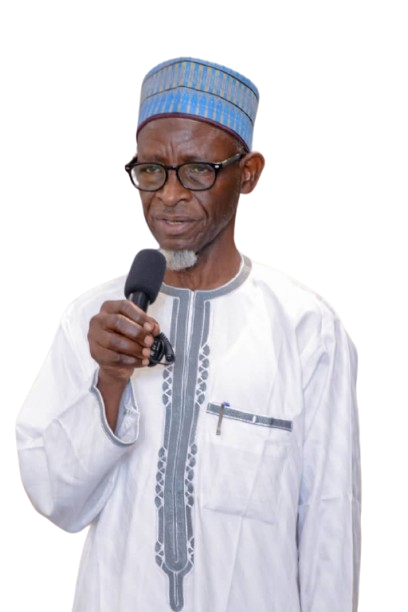About
Fulfulde Voices: Poems of the Soul
The MBA (Muhammad Bashir Abubakar) collection was started from childhood during my primary school days in 1965. I started doing so by reading and copying from my mother’s collection which I later inherited in “ngafakka[1]” in October 1979.
At a later date I started comparing notes with the contemporaries of my mother, who also kept collection of poems as she did. In this way, I copied all those that were not found in the “ngafakka” of my mother. It also happened that all of them were either sisters or first cousins of my mother, being descendants of the following great scholars to which we all belong:
- Modibbo Muhammadu Nakwashiri
- Modibbo Muhammadu Raaji (d.1863)
- Modibbbo Usmanu b. Modibbo Raaji
- Modibbo Aliyu Musa (Towɗo)
MBA collection is therefore a private collection containing Fulfulde Arabic/ajami poetry manuscripts composed largely by Shehu Usmanu bin Foduye and his contemporaries in the 19th century.
This of course, should be handled by reputable professors of linguistics who master the languages of Fulfulde, Arabic and English. They should also be versed in Islamic Studies, in order to explain Qur’anic verses as well as hadith that are found therein.
Other future plans include the recitation of the poems to be recorded in a professional studio with required facilities to be played on cassettes, CDs and other modern electronic audio resources. Also in mind, is the reactivation of the official website for the collection www.fulfuldepoems.com
- Shehu Usmanu
- Abdullahi Gwandu
- Muhammad Bello
- Nana Asma’u
- Sa’idu Bello
- Gharibu Sokoto
- Tukur ɓii Binta
- Dembo ɓii Juuti
- Modibbo Raji
- Taanu Mo iililal
- Modibbo Aminu
- Aminu “Ba” Bello
- Hamaseyo Girei
All along, I was not aware that my collection was so important to academician and researchers, until early in the 90’s when scholars, researchers and academicians started contacting me for one reason or the other, but connected to what I have in store, of the Fulfulde poems. It was that time that I started realizing the significance of the manuscripts that I have in the collection.
It was then I started nursing the idea of establishing a catalog and embarking upon organizing my collection. I also started transcribing few of the poems and transliterating them with some comments on the Arabic words and difficult Fulfulde words they contained. I now have over five hundred (500) manuscripts in various languages and on various topics and themes. I have a room that houses the collection in my residence in the Karewa New Extension in Jimeta, Yola North, Adamawa State, Nigeria.
I later extended the collection by travelling to other parts of Northern Nigeria for more copies of Fulfulde poetry manuscripts. My trips include parts of northern Cameroon as well, where I met other scholars on Fulfulde, Arabic and Islamic Studies for the exchange of views, and also for comparative analysis on similar copies found there. The comparative analysis was more vital at the centre of Waziri Junaidu in Sokoto, where I found many copies that I used in comparing with what I have.
MBA
Mallam Mohammed Bashir Abubakar comes from the family of Modibbo Raji and Modibbo Nakashiri, who were famous for their Islamic scholarship. He acquired his Islamic education at home, beginning with learning the recitation of the Qur’an and basic tenets of Islam from the age of 5. Educated through the traditional system of Islamic learning known as “Janngirde Jawleeji” in Fulfulde, and “Karatun Zaure” in Hausa, Mallam Bashir received advanced training in Islamic Studies by studying classical texts of Islamic law, Qur’anic exegesis, theology and Arabic language and literature. He also studied different genres of Fulfulde poetry and has a large collection of poems, including popular songs and verses written in the nineteenth century.
In addition to his advanced training in the traditions of Islamic learning, Mallam Bashir studied Accountancy at the Ahmadu Bello University, Zaria from 1974 to 1977. He was trained as an Is1amic Banker at the Faisal Islamic Bank of Kibris Ltd., under the sponsorship of International Islamic Banks in Cairo. In 1995 he earned the membership of the Association of National Accountants of Nigeria (ANAN), and became its Fellow in 2009. And in 1999, Mallam

Bashir became an associate member of the Institute of Chartered Accountants of Nigeria (ICAN). His career as a professional accountant culminated in his appointment as the Bursar of Adamawa State University in 2004, making him a Principal Officer of the University, equivalent to the rank of full professor in the academic cadre. Mallam Bashir was the Chairman of the Adamawa State University Mosque Committee as well as the Deputy Chief Imam of the University Jumu’at Mosque.
He is a gifted poet, who has composed many poems in different subjects in Hausa and Fulfulde, his mother tongue. Bashir’s interest in Fulfulde poetry developed from early childhood. This interest was tailored towards singing religious songs, and during his early Qur’anic education in Ganye town of Adamawa State. As far back as 1963, he severally led his peers in singing during religious occasions. At this time, he was reputed to have read mostly poetry such as Awjali, Ibnu Ashir and As’lalul Masaalik. Bashir developed his interest under the tutelage of his uncle Modibbo Hassan Ahmad, one of the most famous poets of his time. Modibbo Hassan confirmed Bashir’s early success in poetry with the development of four critical traits, which made up a good poet namely: burning interest, gifted talent, appetite for reading and exceptional efforts at composition. Bashir’s uncommon appetite for reading early in life, inspired him to seek and collect manuscripts on Fulfulde poetry. He developed an early interest to read these variety of manuscripts and carefully observe the style and form of their rendition. He was soon able to casually develop a rich collection of private manuscripts. His modest efforts took a dramatic turn when he lost his dear mother (October, 1979). From her collection, he inherited a stock of Fulfulde Ajami poems. The size of her Ngafakka (personal leather bag collection of written works) could not be fully captured until 1979. In 1977, Bashir had already opened his Fulfulde Ajami collection to Mary Mcintosh, a doctoral research candidate at the Bayero University Kano. This was the first official opening of his collection and contribution to scholarly work.
Bashir’s attention towards establishing an archive of collections for his work was strengthened in the 1990s when scholars, researchers and academics started contacting him about the subject from different parts of the world. Realizing the significance of the manuscripts in his collection, he saw the compelling need to establish a catalogue and organize his collection into a more orderly, easily retrievable and usable format. He soon embarked on transcribing and transliterating the poems with commentary on the Arabic words they contained. As at 2009, Bashir had over 300 manuscripts in various languages, topics and themes. At some point, he decided to construct a special room for the collection at his residence in Karewa GRA of Jimeta, Yola North, Adamawa State. His collection covers five areas namely: 1. Manuscripts of Fulfulde Poems in Ajami; 2. Letters between Scholars in Fulfulde and Arabic; 3. Islamic Books written in Arabic; 4. Other pieces of Writing such as Prayers, Quotations from the Glorious Qur’an and the Hadith; 5. Manuscripts of Hausa Songs and Praises and others translated from Arabic into Hausa.
His recitations of Fulfulde poems have been recorded on CDs and other archival platforms. His poems that are related to Islam (wa’az) have been regularly broadcast by radio stations in Northern Nigeria, while recitations of his Hausa poems have been broadcast on BBC Hausa Service in London. Mallam Bashir was the poet laureate at several public events in Yola, the headquarters of the Adamawa Emirate in northeast Nigeria. These events include the Golden Jubilee held in July 2003 to celebrate Lamido Aliyu Musdafa’s 50 years (1953 – 2003) on the throne as the Lamido Fombina (leader of the southern Emirate of the Sokoto Caliphate). He was also the poet laureate at the International Conference for the celebration of 200 years of the history of Adamawa Emirate (i.e. 1809 – 2009), and at the installation of the 12th Lamido Adamawa, Dr. Barkindo Aliyu Musdafa in June 2010. Mallam Bashir is also a co-author of Fulfulde Poems, an anthology sponsored by the Organization of the Bicentenary of the Sokoto Caliphate c. 1804 – 2004. Published in June 2004, the anthology has been translated and transliterated into English and French.
Historical Significance and Cultural Context

Fulfulde literature is deeply intertwined with the history and culture of the Fulani people. From the founding of the Sokoto Caliphate by Shehu Usman Fodiyo to the contributions of his successors and disciples, Fulfulde poetry has been a vehicle for the transmission of religious and ethical teachings, as well as a means of expressing the collective aspirations and struggles of the Fulani people. Today, Fulfulde literature continues to be a vital part of the cultural landscape, offering insights into the past and inspiration for the future.
